
One Ecosystem
Scope & Guideline
Connecting disciplines to unveil the complexities of ecosystems.
Introduction
Aims and Scopes
- Ecosystem Services Assessment:
A core focus on evaluating ecosystem services, including their valuation, mapping, and temporal analysis, to inform policy and management practices. - Interdisciplinary Research:
Emphasizes the integration of ecological, economic, and social sciences to provide a comprehensive understanding of ecosystem dynamics and their implications for human well-being. - Sustainable Development Goals (SDGs) Linkage:
Research often explores the connections between ecosystem services and the SDGs, highlighting the role of ecosystems in achieving global sustainability targets. - Innovative Methodologies:
Utilizes advanced methodologies such as GIS, remote sensing, and Bayesian networks to enhance the assessment and management of ecosystem services. - Regional and Global Perspectives:
Includes studies from diverse geographical contexts, addressing both local and global ecosystem service issues, particularly in the context of climate change and urbanization.
Trending and Emerging
- Ecosystem Accounting and Valuation:
A significant increase in research related to ecosystem accounting frameworks, particularly the System of Environmental Economic Accounting (SEEA), highlighting the importance of quantifying ecosystem services for sustainable governance. - Urban Ecosystem Services:
Growing interest in studying ecosystem services within urban environments, focusing on how green infrastructure and urban planning can enhance ecological benefits and human well-being. - Climate Change Adaptation Strategies:
Emerging research on how ecosystem services can be leveraged for climate adaptation, addressing resilience building in urban and rural settings. - Cultural Ecosystem Services:
An increasing focus on the cultural dimensions of ecosystem services, exploring how human experiences and values related to nature contribute to ecosystem management and policy. - Interconnections Between Ecosystems and Human Health:
Research highlighting the links between ecosystem health and human health outcomes is trending, emphasizing the need for integrated approaches to public health and environmental management.
Declining or Waning
- Traditional Biodiversity Studies:
Research focusing solely on biodiversity without explicit connections to ecosystem services is appearing less frequently, as the journal shifts towards integrated assessments that highlight ecosystem services. - Historical Ecological Studies:
Papers centered on purely historical ecological assessments are declining, reflecting a trend towards more applied research that addresses current ecosystem service challenges. - Single-Species Focus:
Research that examines individual species in isolation is becoming less common, as there is a growing emphasis on understanding ecosystems as interconnected systems rather than focusing on single entities. - Local Case Studies without Broader Implications:
Studies that do not connect local findings to broader ecological or policy implications are less frequently published, indicating a preference for research that contributes to global knowledge and practices.
Similar Journals

Environmental Sciences Europe
Empowering researchers for a cleaner, greener Europe.Environmental Sciences Europe is a leading peer-reviewed journal published by SPRINGER, dedicated to advancing research in the field of environmental science, with a specific focus on pollution and its mitigation. Since its transition to Open Access in 2011, the journal has been committed to disseminating high-quality research without barriers, thereby ensuring that critical knowledge is freely accessible to researchers, practitioners, and policymakers around the globe. Based in Germany and with a commendable Q1 ranking in Pollution for 2023, the journal stands out in the Scopus rankings, occupying the 23rd position out of 167 in its category, reflecting its significant impact in shaping environmental discourse. With a convergence of global research efforts projected until 2024, Environmental Sciences Europe aims to provide a vital platform for scholarly communication and collaboration, ultimately contributing to sustainable solutions for pressing environmental challenges.

Nature Sustainability
Pioneering high-impact research in environmental science.Nature Sustainability, published by NATURE PORTFOLIO, is a leading international journal that champions cutting-edge research in sustainability across a multitude of disciplines. Since its inception in 2018, the journal has made significant strides in publishing high-impact articles that address the pressing challenges of our time, from ecology and food science to urban studies and renewable energy. With an impressive impact factor and consistent Q1 quartile rankings in various categories such as Global and Planetary Change and Management, Monitoring, Policy and Law, it stands at the forefront of research dissemination in sustainability. Although access options remain undefined, the journal reaches a wide audience determined to drive impactful change through innovative research within the realm of environmental and social sciences. Nature Sustainability not only illuminates pathways toward sustainable practices but also fosters interdisciplinary collaboration, making it an essential resource for researchers, professionals, and students committed to advancing sustainability initiatives globally.

GLOBAL ECOLOGY AND BIOGEOGRAPHY
Unveiling the Dynamics of Biodiversity and ChangeGLOBAL ECOLOGY AND BIOGEOGRAPHY is an esteemed academic journal published by Wiley that focuses on the dynamic interplay between ecological and biogeographical processes across the globe. With a strong commitment to advancing our understanding of biodiversity, conservation, and global change, this journal has secured a prestigious Q1 ranking in several categories, including Ecology, Ecology, Evolution, Behavior and Systematics, and Global and Planetary Change, highlighting its significant influence in the field. Since its inception in 1998, the journal has consistently provided a platform for high-quality research, featuring original articles that address critical ecological questions and emerging biogeographical trends. Researchers aiming to publish impactful work will appreciate the journal's rigorous peer-review process and its accessibility to a global audience. With a commendable track record reflected in its Scopus rankings, this journal is an essential resource for anyone dedicated to the study of ecology and biogeography.
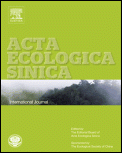
Acta Ecologica Sinica
Pioneering research at the intersection of ecology and sustainability.Acta Ecologica Sinica, published by Elsevier, is a prominent journal in the field of ecology, with a strong focus on fostering understanding in ecological principles and their applications. Established in China, this journal holds an impressive Q2 categorization in both Ecology and Ecology, Evolution, Behavior and Systematics as of 2023, positioning it within the top tier of ecological research. With its Scopus rankings placing it in the 81st and 78th percentiles in relevant ecological domains, it serves as a vital platform for researchers and practitioners to disseminate findings that promote ecological sustainability. Although it operates under a traditional access model, its significant impact is underscored by its systematic convergence of key ecological inquiries across multiple years (2006-2008, 2014, 2017-2023). By engaging with the latest empirical studies, theoretical advancements, and methodological innovations, Acta Ecologica Sinica is indispensable for scholars dedicated to advancing ecological knowledge and addressing environmental challenges.

Ecosistemas
Fostering biodiversity insights and ecological innovation.Ecosistemas is a prominent Open Access journal published by the ASOCIACION ESPANOLA ECOLOGIA TERRESTRE, specializing in the field of ecology. Since its inception in 2001, it has dedicated itself to advancing ecological knowledge and research, fostering an inclusive platform for the dissemination of cutting-edge studies that span ecological interactions, sustainability, and biodiversity. The journal, based in Spain, has established its reputation with notable rankings such as Q3 in the field of Ecology and Q4 in Ecology, Evolution, Behavior, and Systematics, reflecting its commitment to quality research. With a Scopus Ranks position placing it in the 40th and 37th percentiles for its categories, Ecosistemas is integral to the academic community, serving researchers, professionals, and students alike. It provides a vital resource for those seeking to understand ecological dynamics and environmental challenges, facilitating open access to important findings and discussions that shape the future of our ecosystems.
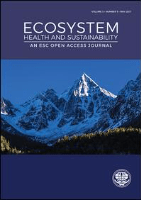
Ecosystem Health and Sustainability
Empowering research to nurture our planet's health.Ecosystem Health and Sustainability, published by the American Association for the Advancement of Science, is a premier journal in the field of ecological research and sustainability. Established as an Open Access journal since 2015, it has made significant strides in disseminating impactful research that addresses contemporary challenges in ecosystem health within a global context. With an impressive impact factor reflected in its consistent placement in the Q1 category across multiple fields—including Ecology, Evolution, Behavior and Systematics, as well as Management, Monitoring, Policy, and Law—this journal serves as a vital resource for researchers, professionals, and students alike. Based in the United Kingdom, the journal has shown notable performance in Scopus rankings, positioning itself within the top percentiles across various ecological specialties. As it continues its convergence through 2024, Ecosystem Health and Sustainability is committed to fostering the exchange of knowledge and promoting the integration of science and policy to advance sustainable practices globally.

Contemporary Problems of Ecology
Uncovering Solutions to Contemporary Ecological IssuesContemporary Problems of Ecology, published by MAIK NAUKA/INTERPERIODICA/SPRINGER, is a premier journal committed to advancing research in the field of Environmental Science. Since its inception in 2008, this journal has carved a niche for itself in addressing the pressing ecological challenges of our times, catering to an audience comprising researchers, professionals, and students dedicated to the sustainability and environmental health of our planet. The journal is indexed in Scopus, with a current ranking of #165 out of 233 in the Environmental Science category, reflecting its contributions to the academic community, despite its position in the 29th percentile. With the latest quartile ranking placing it in Q3 for miscellaneous Environmental Science from 2023, the journal continues to be a vital resource for disseminating innovative research findings. Contemporary Problems of Ecology promotes open access scholarship and aims to foster a dialogue among experts, making it an essential platform for those looking to engage with contemporary ecological issues and solutions. The journal actively seeks to publish original research articles, reviews, and case studies that push the boundaries of our understanding of environmental systems.
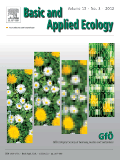
BASIC AND APPLIED ECOLOGY
Transforming ecological knowledge into practical solutions.BASIC AND APPLIED ECOLOGY, published by Elsevier GmbH in Germany, stands out as a premier journal in the field of ecology, evolution, behavior, and systematics. With its ISSN 1439-1791 and E-ISSN 1618-0089, the journal enjoys a distinguished reputation, evidenced by its classification in the Q1 category for Ecology in 2023 and impressively ranking #89 out of 721 in this domain according to Scopus. Since its inception in 2000, it has served as a vital platform for disseminating high-quality research that bridges theoretical insights and practical applications in ecology. Researchers, professionals, and students alike can look forward to the latest findings that not only foster a deeper understanding of ecological processes but also inform sustainable practices crucial for our environment. As the journal continues its journey through to 2024, it remains committed to advancing ecological knowledge and supporting innovative research in an ever-evolving field.
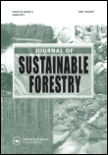
Journal of Sustainable Forestry
Pioneering insights in sustainable forestry and environmental stewardship.Journal of Sustainable Forestry is a premier academic publication dedicated to advancing knowledge and practices in the field of sustainable forestry and environmental management. Published by Taylor & Francis Inc in the United Kingdom, this journal has been a cornerstone for researchers and professionals since its inception in 1992. With an impressive reputation, it boasts a 2023 Q2 ranking in Food Science, Forestry, and Geography, Planning and Development, highlighting its significant contribution to interrelated disciplines. The journal’s impact is further underscored by its Scopus ranking, especially in Forestry where it holds the 43rd position out of 174 publications, placing it in the 75th percentile. Although not open access, the journal remains committed to providing innovative research and practical insights into forest management, ecological sustainability, and policy development. As the field of sustainable forestry continues to evolve, the Journal of Sustainable Forestry serves as an essential resource for those committed to advancing sustainable practices globally, fostering a deeper understanding of how sustainable forestry can contribute to environmental resilience and biodiversity conservation.
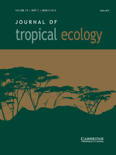
JOURNAL OF TROPICAL ECOLOGY
Exploring the Rich Tapestry of Tropical EcosystemsThe JOURNAL OF TROPICAL ECOLOGY, published by Cambridge University Press, serves as a pivotal platform for advancing knowledge in the field of ecology, particularly within tropical environments. With an ISSN of 0266-4674 and an E-ISSN of 1469-7831, this esteemed journal has been a key resource since its inception in 1985, maintaining a focus on empirical research that addresses the complexities of tropical ecosystems. It holds a respectable Q3 ranking in the Ecology, Evolution, Behavior and Systematics category as of 2023, indicating its significant contribution to the field, although it remains within the competitive mid-range. The journal publishes original research, reviews, and methodological articles that illuminate the rich biodiversity and unique ecological processes of tropical regions, fostering a deeper understanding of conservation challenges. Accessible from the United Kingdom, this publication appeals to a diverse audience of researchers, professionals, and students keen on exploring ecological dynamics in tropical settings, and plays a crucial role in promoting scientific discourse and collaborative efforts aimed at preserving our planet's vital ecosystems.